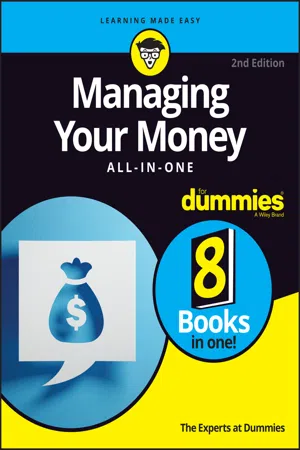
Managing Your Money All-in-One For Dummies
- English
- ePUB (mobile friendly)
- Available on iOS & Android
Managing Your Money All-in-One For Dummies
About This Book
A hands-on, power-packed guide to managing all things money
Time and money. Those are the two most important assets you have, and smart people manage both of them wisely. Managing Your Money All-in-One For Dummies is your one-stop resource to turn to when you're ready to manage your money. It offers everything you need to confidently handle your finances. When you're ready to create a budget, pay down debt, and scale back your expenses, you'll find the support you need here. If you're eyeing the future, you'll find advice on improving your credit score, saving for college and retirement, and planning an estate. As if all of that isn't enough, this comprehensive book covers other financial topics such as buying insurance, investing in your 401(k), and so much more.
The authors of Managing Your Money All-in-One For Dummies explain how to handle your money in a way that encourages you to think and act positively, no matter what your financial situation looks like. And as you move toward financial freedom, you can come back to this book to get advice on topics that go beyond day-to-day money management, such as taking out a mortgage, investing online, and more.
- Get your financial life in order, whatever your stage of life
- Make a budget, manage your credit, and pay down your debt
- Demystify financial reports, online investing, and retirement plans
- Save for college and learn how to balance your saving and spending habits in any economy
- Navigate the new norm of online banking
Spend some time learning how to manage your money today. It'll be a wise investment of both of your most valuable assets.
Frequently asked questions
Information
Taking Charge of Your Finances
Contents at a Glance
- Chapter 1: Assessing Where You Are Financially
- Asking Some Preliminary Questions
- Evaluating Your Relationship with Money
- Checking Out Your Credit Reports
- Finding Out Your FICO Score
- Comparing Spending and Income
- Assessing Your Spending Habits
- Cataloging What You Own
- Adding Up What You Owe
- Chapter 2: Improving Your Relationship with Money
- Working with Your Partner to Achieve Financial Goals
- Believing in Yourself
- Handling Setbacks
- Asking for Help
- Digging Out of Debt
- Budgeting for the Future
- Chapter 3: Building and Sticking to a Budget
- Comparing Monthly Spending and Income
- Tackling a Budget Deficit
- Paying the Important Stuff If You Can’t Pay Everything
- Examining a Budget Surplus
- Finalizing and Sticking to Your Budget
- Chapter 4: Cutting Spending and Boosting Income
- Finding Ways to Spend Less
- Bringing in More Bucks
- Chapter 5: Cleaning Up Your Credit Reports
- Understanding the True Value of Good Credit
- Reviewing Your Reports for Problems
- Using the Law to Get Your Credit Record Clean and Keep It That Way
- Identifying and Disputing Inaccurate Information
- Adding Positive Information to Your Credit Report
Assessing Where You Are Financially




Asking Some Preliminary Questions
- Are you clueless about how much you owe your creditors?
- Over time, is a growing percentage of your household income going toward paying your debts?
- Do you ever pay your bills late because you don’t have enough money?
- Have you stopped paying some of your debts?
- Are you paying only the minimum due on some of your credit cards because you can’t afford to pay more?
- Are you using credit and/or credit card cash advances to help pay debts and/or your basic living expenses, such as groceries, rent, or utilities?
- Have you maxed out any of your credit cards, or have any of your cards been cancelled for nonpayment?
- Do you have little or nothing in savings?
- Have you borrowed money from friends or relatives to pay your bills?
- Have debt collectors begun calling you, and/or are you receiving threatening notices from some of your creditors?
- Are you having a hard time concentrating at work because you are worried about money?
- Are you losing sleep because of your finances?
- Have you and your spouse or partner begun to fight about money?
- Are you drinking more or using illegal drugs to try to cope with your money worries?
- Are you an overspender? According to Debtors Anonymous, most compulsive spenders answer “yes” to at least 8 of 15 questions they pose at

www.debtorsanonymoussb.org/takethetest.html.